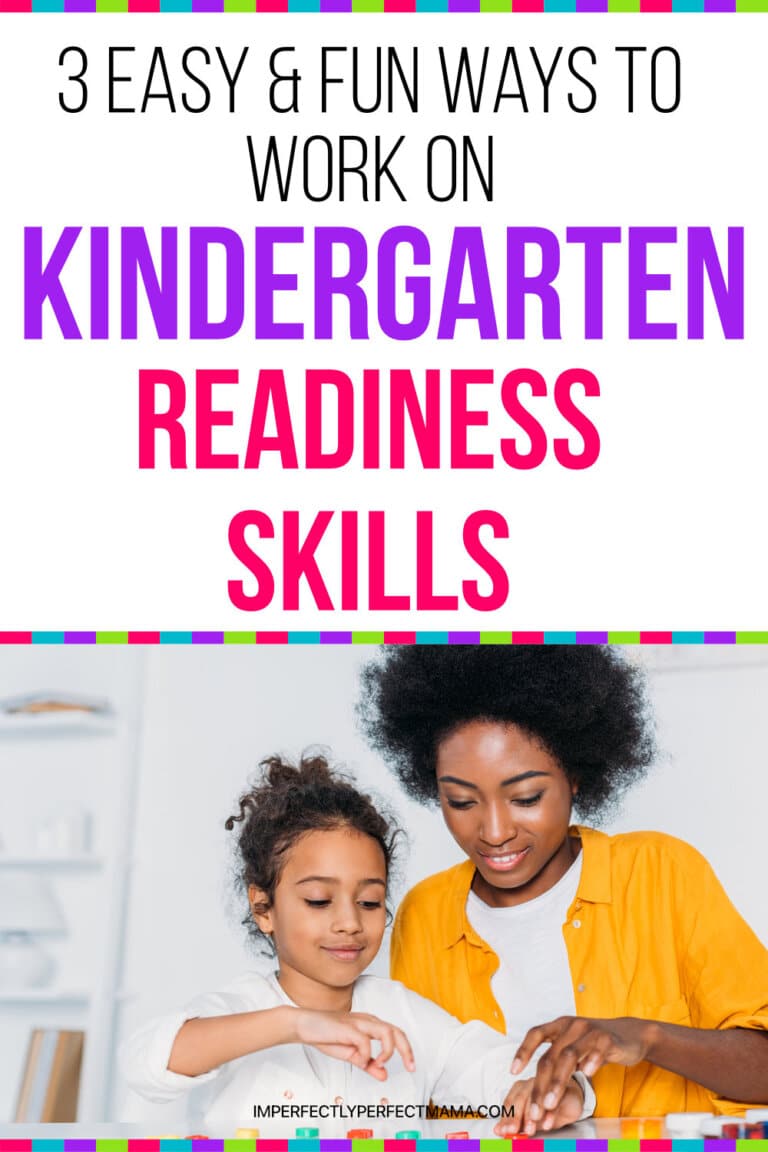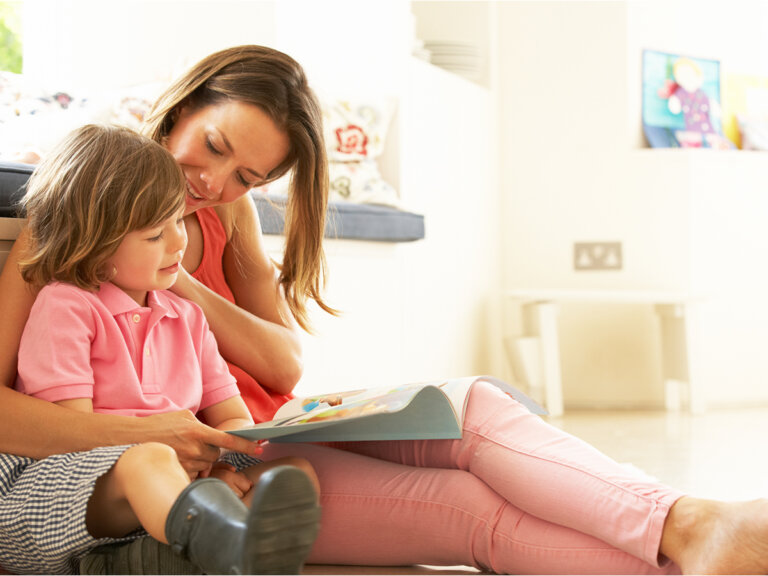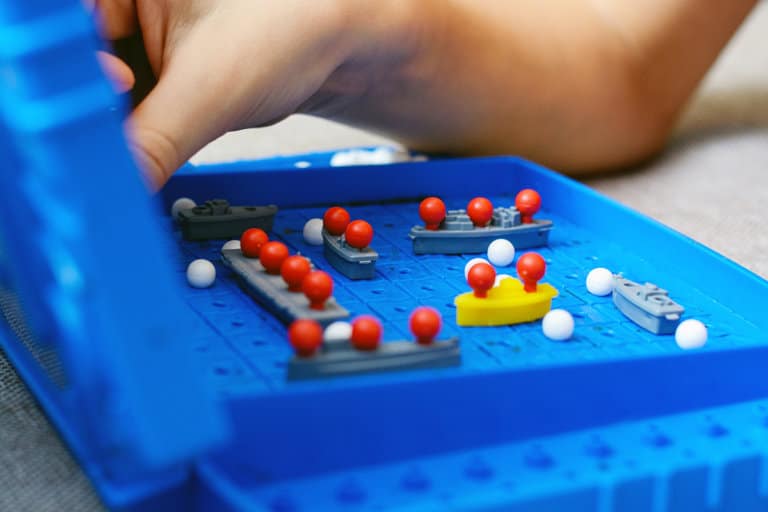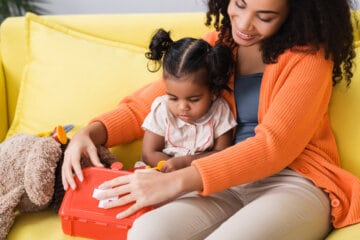If you’ve got a kid entering Kindergarten soon, you likely have had these thoughts in the back of your mind for awhile: Is my kid ready?

Will they be okay?
Will they like school, make friends, be successful….and on it goes!
As an educator and a mama with a soon to be Kindergartener, I’m right there with you.
But I have good news: I have three easy ways you can work on Kindergarten readiness skills TODAY.
And, bonus: These are things you can easily add into your family’s busy schedule.
You may even be doing some of these things already, but you can do some simple things to increase the impact they have on your kids success as they start school!
1. Read Every Day

Early literacy skills are so important for Kindergarten success. And do you know the most effective strategy for becoming a better reader? It’s by spending time reading! Start setting aside a daily time for your child to spend time with books. Here are some ideas on how you can support early literacy skills:
Read to Them
Use some of these simple strategies to build comprehension and enjoyment for reading!
- Before reading, ask your child to look at the front cover and title and make a prediction about what the book is about.
- During reading, ask them questions about what you read after every page or so. The 5Ws (who, what, why, where, and when) are great question starters.
- After reading, ask your child to retell the story and discuss their favorite part of the story.
Read with Them
Have a family reading time where everyone does sustained silent reading with their own books. Even though your Pre-K child can’t actually read yet, they can “read” by doing picture walks with their books.
They begin to build reading stamina. Plus, you are modeling being a good reader for your kids just by sitting and enjoying your own book!
Read a Variety of Genres
Reading a variety of genres, such as fiction, nonfiction, poetry, and biographies, ensures that your child is exposed to different forms of literature.
They have the opportunity to read about a variety of topics and increase their reading enjoyment.
Reading themed lists, such as these lists of books about summer and books about baseball, provide a fun way to expose your child to a variety of genres.
Rereading Favorite Books
Rereading your child’s favorite books may not always be fun for you, but it’s important for them!
Rereading books supports reading fluency and familiarity with a text. Your child may even start reading words or phrases alone which increases their reading confidence!
2. Play Games Often

When I was a new elementary teacher years ago, I soon realized that my students were struggling with what I considered simple tasks and expected behaviors.
They couldn’t read or follow directions well, they had poor sportsmanship when playing classroom and recess games, and they struggled with knowing how to work well with others.
I began implementing a weekly board game time and focused on teaching these skills explicitly and guess what?
I noticed almost immediate improvement that just grew over time the more we played games together.
Playing games is not only a fun activity for your family to do together, but there are so many academic and social benefits as well – ones that can really help prepare your child for kindergarten!
Learning How to Work With Others
Whether they are deciding who goes first, how to set up the game board, or playing team games, kids learn a lot about just getting along and working with others when playing games.
This goes a long way both in the classroom and on the playground.
Reading and Following Directions
While my pre-K son can’t read the instructions, I am sure to read a new game’s rules out loud to him and then have him retell to ensure his understanding.
We discuss the importance of everyone following the rules so that the game is fair for us all. Sometimes he likes to play with his game boards, cards, and pieces by himself for fun, but he knows when he plays a game with others, we will follow the rules.
Following directions is a huge skill needed for school success.
In fact, most of my preschool conferences with my son revolved around his ability to follow directions.
Playing games is the perfect way to hone this skill!
Good Sportsmanship Skills
Kindergarten teachers often use games for age appropriate learning activities and center time. What does your child do when they win?
What do they do when they lose? This is definitely a work in progress for our son, who already has quite a competitive streak and doesn’t like to lose!
But I notice the more we play games, the more used to losing and being okay with it he becomes. And the more gracious he is as a winner.
A quick tip for teaching sportsmanship: After playing a game with your kids (even if it’s just you and one kid!) always have all players shake hands or high five and say “good game!”
That simple act goes a long way in supporting good attitudes after playing a game.
Math Skills
Reading numbers on dice, cards, and spinners, spatial skills, and moving spaces along a board are math skills that you will see your child improve in when playing games!
Some of our favorite games for pre-kindergarteners are: Zingo, Crazy Eights, Chutes and Ladders, Matching games, I Spy Preschool Game, I Spy Dig in, Yahtzee Jr., and Sequence for Kids.
3. Nursery Rhymes and Songs

Exposing your child to nursery rhymes and songs has so many academic and social benefits!
Academic
The academic benefits to singing nursery rhymes with your young child are many and varied:
- Understanding structure and patterns in language
- Exposure to new vocabulary
- Making predictions in what word(s) will come next in a song or text
- Rhyming skills
Social & Emotional Skills
Social and emotional skills are also supported by nursery rhymes:
- Speech development and speaking clarity
- Imagination and creativity
- Humor and play
- Sharing and enjoying familiar stories and songs with peers
Some nursery rhymes to listen to are: The Kiboomers Top 33 Nursery Rhymes, Little Baby Bum Nursery Rhymes, and Cedarmont Kids Preschool Songs.
Reading, playing games, and singing nursery rhymes are simple but effective ways to ensure your young child has a strong foundation in both academic and social skills when they start school.
Tell me – which of these are you going to do with your child today?




Leave a Reply